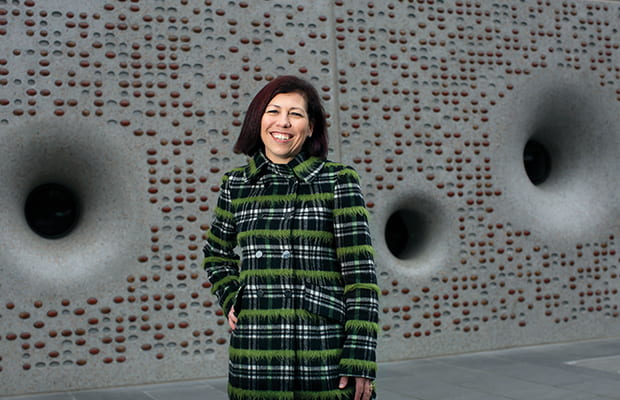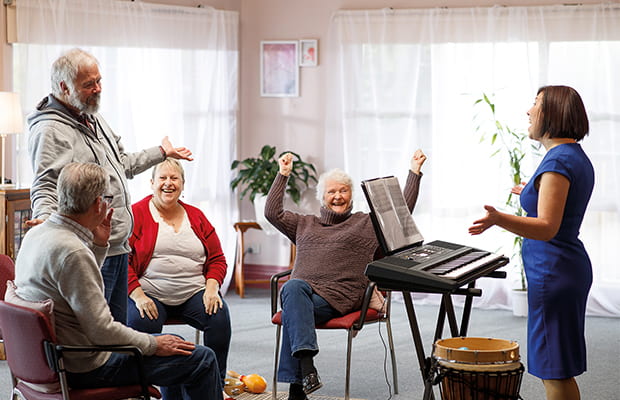A therapeutic beat
Music is helping people with dementia to connect with their carers, writes Kate Cole-Adams.
Two women are singing side by side on a sofa, swaying to the music. “I know you love Amazing Grace,” the younger woman reminds her mother.
Now she plays another old favourite, a slow song. The older woman joins in at first, but then frowns and starts plucking restlessly at her hands. Suddenly, she stands and moves away. Whimpers. Hides her face in her palms.
It is a scene that may strike a chord for anyone who has a family member or loved one with advancing dementia: the abrupt changes of mood, the growing agitation. And, for the carer, that familiar sense of helplessness.
But what happens next may not be so familiar.
As she registers her mother’s agitation, Joanne calmly changes the music. This time she puts on a jazzy number with a distinct beat. Smiling, she takes her mother’s hands, moves them in time to the music, urges her to dance. “Spin me mum, spin me! . . . I remember you and dad used to do this all the time.” Her mother smiles back, tentative at first; now laughing. Together, they twirl.
This small exchange happened seven years ago but has helped pave the way for a new study that could help transform the care of people living with dementia, including Alzheimer’s disease. The scene is depicted in a video reconstruction of part of a pilot that has since evolved into a major multinational study. Led by Professor Felicity Baker, the Homeside study will assess the use of music as a targeted intervention to improve the quality of life not only for people with dementia, but also for those caring for them at home, potentially enabling people to live in familiar surroundings for longer and saving millions of dollars along the way.
“The beautiful thing about music, is that it has a unique potential to stimulate autobiographical recall,” says Professor Baker, head of Music Therapy at the Melbourne Conservatorium of Music, and director of International Research Partnerships for the Creative Arts and Music Therapy Research Unit.
She says music activates brain pathways that remain relatively intact even in people with advanced dementia. Familiar songs arouse positive emotions and help people reconnect with their memories.
Unlike other studies that have focused on the effects of music therapy in care-home settings, the Homeside study aims to teach family carers of people with dementia to use music strategically to help manage the distressing behaviours associated with dementia.
Crucially, as well as assessing the impact of the intervention on dementia symptoms such as agitation and depression, this study measures changes in the carers’ own quality of life, levels of depression and resilience, and how competent they feel in the caring role.
Professor Baker uses the word “attunement” to describe how Joanne responded to her mother that day. The process involves carers using familiar songs to tune in to the emotional states of their loved one to encourage connection.
“We show carers how to sing in a way that initially matches the level of distress in the person with dementia, and to then slowly adapt the way they sing to encourage the person with dementia to follow them and calm down.”
These strategies are not difficult to teach, she says. During the study, a trained music therapist comes to the home to provide one-on-one training for the primary carer. Carers learn how to interpret the body language, behaviours and moods of the person with dementia, and then how to select music appropriate for that moment and adjust it when necessary.
The study will include an economic analysis comparing the cost-benefits of delivering the intervention training with the costs of not. Given estimates that the 2015 global cost of dementia was $US818 billion and rising, the stakes are high.
The study is being coordinated through the European Union’s Joint Programme for Neuro-degenerative Diseases, and funded locally by the National Health and Medical Research Council. Professor Baker and her teams in Australia, Germany, the UK, Poland and Norway are now recruiting participants for the study.
The next step Professor Baker and her team hope to develop is different modes of training, including a mobile device app, so that the training can be delivered globally, adapting the music and the content of the interventions to accommodate different cultural needs.
Professor Baker emphasises that you don’t need to be a good singer. The aim of the music is to support the central relationship between the person with dementia and their carer – and to help each find new meaning in sometimes confusing moments. “Music is the connector,” she says.
But the results can be transformative. “You see the person behind the dementia. All of a sudden, they become activated, they come out of themselves. They start to look at you, recognise you, smile, and through doing so, offer precious moments of connecting with their carer.”
Professor Baker and her team are developing a music therapy app that carers can use at home. Gifts will help fund the development of the app, which will support the lives of family carers and people living with dementia.




